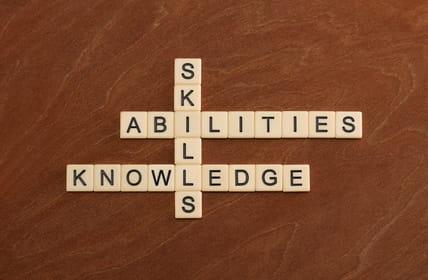8 Effective Negotiation Training Skills

What are the top 8 negotiation skills that you and your organisation need to achieve better results? These negotiator skills do require training and reinforcement when they are not present naturally.
We learn a lot from school and later skills training, but the truth is that unless we learn the most important lessons and can apply these skills outside of the classroom in the tough school of hard knocks we call ‘real life‘, our results will be less than stellar. So which are the training course theories that will serve us best in the real world in our business negotiation challenges?
Learning to negotiate effectively in a negotiation does not come naturally to everyone. A few of us read the books, fewer still take a training course. It’s not until you step up to the mark to negotiate that the really valuable skills are learned. So negotiation skills training with practical role plays followed by immediate video feedback of your performance are what we find to be the most valuable.
So, here’s an 8 point checklist you can review to understand what traits make an effective negotiator. It should help to find out where you are, and where you need to go in your training progression.
1. Knows what’s going on
We cannot be effective negotiators if we don’t know or have a handle on the goals and objectives of our company or organization. We have to be tuned in to the strategic aims of what management is striving to attain. Otherwise, we will find ourselves in the situation of ‘the right hand doesn’t know what the left hand is doing‘.
Naturally, it is clearly up to management to plainly state and communicate these training objectives throughout the levels of its personnel. If you find yourself in a situation where you aren’t clear where your organization is going, you need to find your training goals to be in line with your organization‘s goals to hit your target. Good negotiators always have their finger on the pulse and thrust of the long term goals and objectives of their company or organization
2. Prepare – Prepare – Prepare
A good negotiator can only be effective when they are prepared. We have to do our homework and research before the negotiation or else we will be left groping about in the dark. We need to have all our ducks in a row by gathering all the available and applicable information to have on hand when we need it. To be unprepared is just asking for trouble. Negotiation preparation is the most important stage stage of negotiation to be effective. Sellers enjoy the advantage of knowing their product and market more deeply than buyers. We train buyers in contract negotiation to counter their disadvantage through employing competitive tendering processes.
3. Learn – Probe – Learn
Effective negotiation skills requires that we keep our ear to the ground to snoop like a nosy detective. When we sit down with our negotiation counterpart, we often don’t have a lot of information about the aims of the other side. Every time we sit down with our counterparts we must be effective in learning to pry information from them to see the picture from their point of view. The more we can learn about our counterparts and what they need or want, the better are we able to develop our proposals or evaluate theirs. We should always know our BATNA and walk away levels. Of course with good negotiation team discipline and training, we need know what lurks behind their motivations. So make sure you’re talking with the right people.
4. Sees the BIG picture
One very important trait we need to develop and groom is the ability to be dexterous and flexible like a gymnast. The trainable negotiating process is like the currents in a river. They are ever-changing. We can’t go into the game with a fixed mind-set as this will result in tunnel vision. Being flexible allows us to change the rules of the negotiation game as we might have to help our counterpart realize the merits of an agreement and the possibilities we both can enjoy together. Similarly, as we learn more from our opposite number, we can learn new skills and adjust our strategy as the negotiation play unfolds.
5. Thick skinned or staying cool
Learn to roll with the punches. Emotions in negotiations can get heated. A smart negotiator never takes what’s said as a personal affront and has the skill to separate the issues from emotions. So, we must always be detached and maintain our perspective and be focused on our objectives. It’s not about us and it’s not about them – it’s about why we are negotiating.
6. Can break down the barriers
There are many forms of barriers that act as sticking points, causing our skilled negotiators to become bogged down. Effective negotiation demands that we recognize the ‘fly in the ointment‘ and understand the nature of the problem that stands so resolutely in our way. Once we understand the sticking point, we are able to sniff out the reasons for these barriers. Most things are the result of ‘cause and effect‘, so once we know the nature of the beast that stands in our way, we can train our attention to discover solutions and options to negate and neutralize them. Often our best ideas come from others. So who has the skills in your organization to brainstorm with?
7. Can find allies
Even with the best training in the world, we don’t always find ourselves operating from a position of strength. It even might seem we don’t have much to work with at the initial stages of our negotiation, so sometimes we need to find ways to skilfully enhance our position at the table. This often occurs in multi-party negotiations either within an organization or with multiple external negotiating parties. Those skilled in effective negotiation techniques know that there is strength in numbers, and they ferret out allies to form coalitions to increase their negotiating power.
8. Has a trusting reputation
‘Fool me once – shame on you…’ Everyone with whom we negotiate forms an impression of who we are as a negotiator. If we create a negative perception where we appear sneaky and disreputable, this character trait is going to follow us around like a bad smell. It will likely haunt us down the road in our future negotiations.
If you’ve haggled with a tricky negotiators who played you like a fish, how do you think you will deal with this person again? How effective will you be in trying to create a good agreement or relationship with someone you don’t trust? It’s a two way street. We cannot be effective in our negotiations when our counterpart believes we are trying to stiff them. Integrity and trustworthiness are vital to our reputation as effective negotiators. Enough said.
Conclusion
So, how did you fare? Take heart if you have an opportunity to improve your skills, there is little that training cannot assist you in achieving. Once you pinpoint where you might be lacking, you can take training steps and address any shortcomings you might have identified. Take good training courses, read material that can aid you in developing these traits. Above all else, experience is one of the best teachers that can help you in your quest to be a top-notched negotiator. Learn from your mistakes, because we’ve all traveled down the same road.
- Max H. Bazerman, Margaret A. Neale, ‘Negotiating Rationally’, The Free Press – MacMillian, (1992).
- J. Lewicki, A. Litterer, W.Minton, M. Sauders, ‘Negotiation’, 2nd Edition, Irwin,(1994).
YOU MAY ALSO LIKE





Well articulated and crisp.
I agree that experience is the best teacher. Thanks for the bullet points on negotiating. It was helpful.